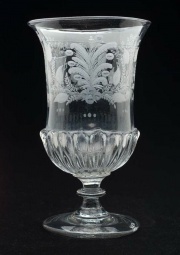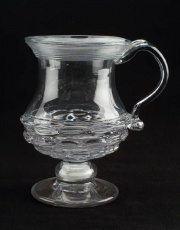Difference between revisions of "Flint glass"
Jump to navigation
Jump to search
| Line 2: | Line 2: | ||
== Description == | == Description == | ||
| − | An optical quality glass with a high refractive index and low dispersion. Flint glass was a typically a [[potash-lead glass]] used for optical lenses and crystal glassware. However, since the manufacture and disposal of lead glass are a source of pollution, modern flint | + | An optical quality glass with a high refractive index and low dispersion. Flint glass was a typically a [[potash-lead glass]] used for optical lenses and crystal glassware. However, since the manufacture and disposal of lead glass are a source of pollution, modern flint glass contain a wide variety of non-lead metal oxides including [[titanium dioxide]] and [[zirconium dioxide]]. |
See also [[crystal glass|crystal]]. | See also [[crystal glass|crystal]]. | ||
| Line 25: | Line 25: | ||
== Resources and Citations == | == Resources and Citations == | ||
| − | + | * Wikipedia: [https://en.wikipedia.org/wiki/Flint_glass Flingt glass] (Accessed Oct. 2023) | |
* G.S.Brady, ''Materials Handbook'', McGraw-Hill Book Co., New York, 1971 Comment: p. 383 | * G.S.Brady, ''Materials Handbook'', McGraw-Hill Book Co., New York, 1971 Comment: p. 383 | ||
| − | |||
* Walter C. McCrone, John Gustave Delly, ''The Particle Atlas'', W. McCrone Associates, Chicago, IV, 1972 | * Walter C. McCrone, John Gustave Delly, ''The Particle Atlas'', W. McCrone Associates, Chicago, IV, 1972 | ||
| − | |||
* Susan E. Schur, Conservation Terminology: A review of Past & Current Nomenclature of Materials, ''Technology and Conservation'', Spring (p.34-39); Summer (p.35-38); Fall (p.25-36), 1985 | * Susan E. Schur, Conservation Terminology: A review of Past & Current Nomenclature of Materials, ''Technology and Conservation'', Spring (p.34-39); Summer (p.35-38); Fall (p.25-36), 1985 | ||
| − | |||
* ''Dictionary of Building Preservation'', Ward Bucher, ed., John Wiley & Sons, Inc., New York City, 1996 | * ''Dictionary of Building Preservation'', Ward Bucher, ed., John Wiley & Sons, Inc., New York City, 1996 | ||
Revision as of 12:28, 19 October 2023
Description
An optical quality glass with a high refractive index and low dispersion. Flint glass was a typically a Potash-lead glass used for optical lenses and crystal glassware. However, since the manufacture and disposal of lead glass are a source of pollution, modern flint glass contain a wide variety of non-lead metal oxides including Titanium dioxide and Zirconium dioxide.
See also crystal.
Synonyms and Related Terms
cristal de chumbo com potássio (Port.)
Physical and Chemical Properties
| Melting Point | 630 C (softens) |
|---|---|
| Density | 2.9-5.9 g/ml |
| Refractive Index | 1.45-2.00 |
Resources and Citations
- Wikipedia: Flingt glass (Accessed Oct. 2023)
- G.S.Brady, Materials Handbook, McGraw-Hill Book Co., New York, 1971 Comment: p. 383
- Walter C. McCrone, John Gustave Delly, The Particle Atlas, W. McCrone Associates, Chicago, IV, 1972
- Susan E. Schur, Conservation Terminology: A review of Past & Current Nomenclature of Materials, Technology and Conservation, Spring (p.34-39); Summer (p.35-38); Fall (p.25-36), 1985
- Dictionary of Building Preservation, Ward Bucher, ed., John Wiley & Sons, Inc., New York City, 1996

